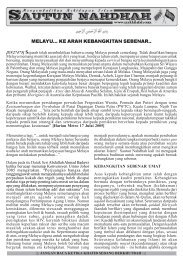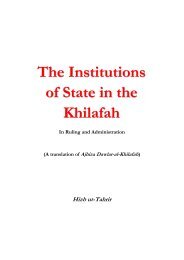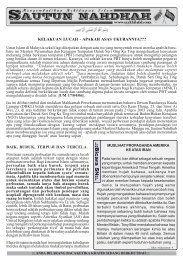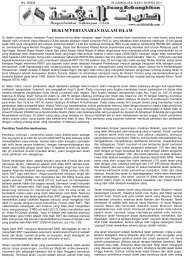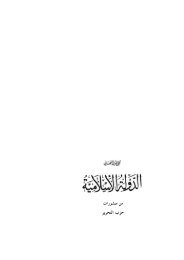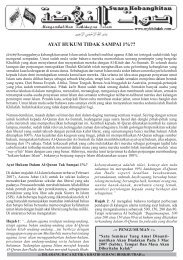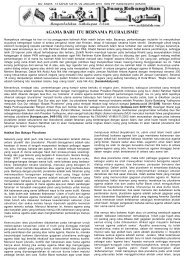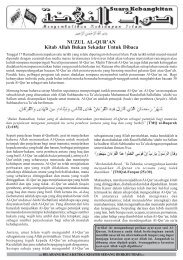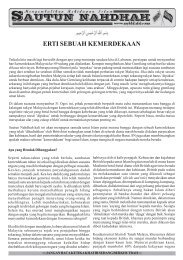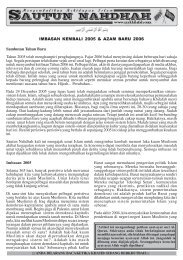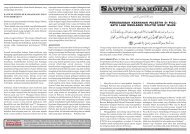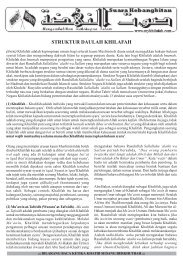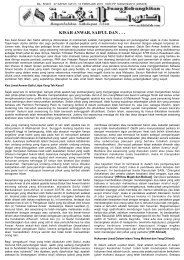A Warm Call from Hizb ut-Tahrir to the Muslims - MyKhilafah.com
A Warm Call from Hizb ut-Tahrir to the Muslims - MyKhilafah.com
A Warm Call from Hizb ut-Tahrir to the Muslims - MyKhilafah.com
Create successful ePaper yourself
Turn your PDF publications into a flip-book with our unique Google optimized e-Paper software.
50 u A <strong>Warm</strong> <strong>Call</strong> <strong>from</strong> <strong>Hizb</strong> <strong>ut</strong>-<strong>Tahrir</strong> <strong>to</strong> <strong>the</strong> <strong>Muslims</strong><br />
considered Dhalaal (misguidance) a synonym <strong>to</strong> Kufr (disbelief) that<br />
resulted <strong>from</strong> following conjecture that is nothing b<strong>ut</strong> falsehood. As for<br />
those who worship idols, Allah said that by worshipping Allah and<br />
ascribing idols <strong>to</strong> Him and believing that <strong>the</strong>y would benefit <strong>from</strong><br />
this, such people are following speculation and devising lies. It is<br />
<strong>the</strong>refore clear that <strong>the</strong>se verses are confined <strong>to</strong> <strong>the</strong> creeds. These verses<br />
are also explicit in rebuking those individuals who build <strong>the</strong>ir creed on<br />
conjecture and speculation and not on certainty by describing <strong>the</strong>m as<br />
liars and followers of <strong>the</strong>ir own desires, b<strong>ut</strong> that which <strong>the</strong>se individuals<br />
follow will be of no avail against <strong>the</strong> tr<strong>ut</strong>h. All of this is a clear <strong>com</strong>mand<br />
<strong>to</strong> build <strong>the</strong> creed on decisive, certain and definite knowledge (‘ilm), and<br />
at <strong>the</strong> same time it is a clear prohibition for building <strong>the</strong> creed on<br />
conjecture and speculation. It also clearly indicates that those who build<br />
<strong>the</strong>ir creed on speculation, for <strong>the</strong>m such belief will be of no avail before<br />
Allah . Instead such people must search and examine closely <strong>to</strong> ensure<br />
<strong>the</strong>ir belief is built on certainty and absol<strong>ut</strong>e tr<strong>ut</strong>h, so <strong>the</strong> evidences<br />
must be conclusive and cannot be speculative.<br />
Thus, <strong>the</strong> thought which is <strong>from</strong> <strong>the</strong> ‘Aqeedah must be established by a<br />
definite evidence (Daleel Qatai) and it cannot be established by a<br />
speculative evidence (Daleel Zanni), even if it is a Shar’i evidence. The one<br />
who builds his belief on a speculative evidence is not accused of Kufr,<br />
because when Allah censured it in <strong>the</strong> verses He did not say that <strong>the</strong><br />
person had gone astray or had be<strong>com</strong>e a disbeliever, b<strong>ut</strong> only said that<br />
he is lying, following his desires, and that whatever he has followed will<br />
not avail him of <strong>the</strong> tr<strong>ut</strong>h. This does not make him a Kaafir, b<strong>ut</strong> he will<br />
be sinful and will have <strong>com</strong>mitted Haram by building his ‘Aqeedah on<br />
speculation (Thunn). This because he has violated a <strong>com</strong>mand that Allah<br />
has enjoined upon him. Allah has obliged <strong>the</strong> building of <strong>the</strong> ‘Aqeedah<br />
on certainty (Yaqeen), while he built his belief on speculation (Zann). So<br />
he did what Allah decisively forbade him <strong>to</strong> do, <strong>the</strong>refore he has<br />
<strong>com</strong>mitted Haram. Allah decisively forbade him <strong>from</strong> building his belief<br />
on speculation b<strong>ut</strong> he did so. (Hence, <strong>the</strong> mechanism <strong>to</strong> establish Islam<br />
in both <strong>the</strong> individual and in society has been clearly defined). As for <strong>the</strong><br />
nature of <strong>the</strong> conclusive evidences <strong>from</strong> which <strong>the</strong> ‘Aqeedah is taken, we<br />
find <strong>from</strong> examining <strong>the</strong> Shar’i evidences of Islam that <strong>the</strong> conclusive<br />
evidences are restricted <strong>to</strong> three categories and <strong>the</strong>y are ration, <strong>the</strong> Noble<br />
Qur'an and M<strong>ut</strong>awatir (recurrent) Hadith, for which it has been definitely<br />
proven witho<strong>ut</strong> a shadow of a doubt, that <strong>the</strong> Rasool said it. The<br />
A <strong>Warm</strong> <strong>Call</strong> <strong>from</strong> <strong>Hizb</strong> <strong>ut</strong>-<strong>Tahrir</strong> <strong>to</strong> <strong>the</strong> <strong>Muslims</strong> u 51<br />
‘Aqeedah is not taken <strong>from</strong> anything o<strong>the</strong>r than <strong>the</strong>se three evidences. It<br />
is forbidden <strong>to</strong> take <strong>the</strong> ‘Aqeedah <strong>from</strong> anything o<strong>the</strong>r than <strong>the</strong>m because<br />
it would be speculation (Thunn) and not certainty (Yaqeen).<br />
As for Ahkam, <strong>the</strong> evidences for <strong>the</strong>ir adoption are not stipulated <strong>to</strong> be<br />
conclusive; ra<strong>the</strong>r it is sufficient for <strong>the</strong>m <strong>to</strong> be speculative (Thunni).<br />
When a Muslim has <strong>the</strong> least amount of doubt that this Hukm is <strong>the</strong><br />
Hukm of Allah on <strong>the</strong> issue, <strong>the</strong>n it is permissible for him <strong>to</strong> adopt it; in<br />
fact it be<strong>com</strong>es <strong>the</strong> judgement of Allah with respect <strong>to</strong> him. Thus, when<br />
an Ayah of <strong>the</strong> Qur'an is open <strong>to</strong> interpretation, <strong>the</strong>n its evidence for <strong>the</strong><br />
Hukm Shar’i is a speculative one (dalaalah THunniyyah). One person may<br />
understand it in a certain manner, while ano<strong>the</strong>r person may understand<br />
it in ano<strong>the</strong>r manner, and both are valid Hukm Shar’i. The same view<br />
applies <strong>to</strong> <strong>the</strong> M<strong>ut</strong>awatir Hadith. When it is open <strong>to</strong> a number of<br />
meanings, <strong>the</strong>n its evidence for <strong>the</strong> Hukm Shar’i is a speculative one<br />
(Dalaalah Zanniyyah). Also, non-M<strong>ut</strong>awatir Hadith is speculative in its<br />
indication and not definite. It is an evidence for <strong>the</strong> Hukm Shar’i and it<br />
is speculative, whe<strong>the</strong>r its wording indicates only one meaning or a<br />
number of meanings. It is, however, allowed for one <strong>to</strong> adopt <strong>the</strong> Hukm<br />
that it indicates. The evidence for <strong>the</strong> fact that a speculative evidence is<br />
sufficient for adopting a rule is <strong>from</strong> what Bukhari has narrated <strong>from</strong><br />
Nafi', who narrated on <strong>the</strong> a<strong>ut</strong>hority of Ibn 'Umar (r.a.), who said that<br />
<strong>the</strong> Prophet on <strong>the</strong> day of Ahzab said:<br />
"Let none of you pray A'sr except in Bani Qurayzah." 'Asr time<br />
came when some of <strong>the</strong>m were on <strong>the</strong>ir way <strong>to</strong> Banu Qurayzah, so some<br />
of <strong>the</strong>m said, "we shall pray now for <strong>the</strong> time of 'Asr came. Some of<br />
<strong>the</strong>m said, we shall not pray until we reach it (i.e. delaying <strong>the</strong> prayer),<br />
while o<strong>the</strong>rs said, we should ra<strong>the</strong>r pray, for it is not that what was<br />
wanted <strong>from</strong> us. This was mentioned <strong>to</strong> <strong>the</strong> Prophet who did not<br />
rebuke any one of <strong>the</strong>m. This demonstrates that <strong>the</strong> Rasool <br />
acknowledged <strong>the</strong> adoption of <strong>the</strong> Shar’i rule with <strong>the</strong> least amount of<br />
doubt. Not <strong>to</strong> mention that <strong>the</strong> Prophet sent, at one time, twelve<br />
messengers <strong>to</strong> twelve kings, calling <strong>the</strong>m <strong>to</strong> Islam. Each messenger was<br />
sent individually <strong>to</strong> each location. If conveying <strong>the</strong> Da’wah through <strong>the</strong><br />
report of one person had not been obliga<strong>to</strong>ry <strong>to</strong> follow, <strong>the</strong> Rasool <br />
would not have been content <strong>to</strong> send one person <strong>to</strong> convey <strong>the</strong> da'wah.<br />
This is clear evidence <strong>from</strong> <strong>the</strong> action of <strong>the</strong> Rasool that <strong>the</strong> report of<br />
1<br />
2<br />
3<br />
4<br />
5<br />
6<br />
7<br />
8<br />
9<br />
10<br />
11<br />
12<br />
13<br />
14<br />
15<br />
16<br />
17<br />
18<br />
19<br />
20<br />
21<br />
22<br />
23<br />
24<br />
25<br />
26<br />
27<br />
28<br />
29<br />
30<br />
31<br />
32<br />
33<br />
34<br />
35<br />
36<br />
37<br />
38<br />
39



